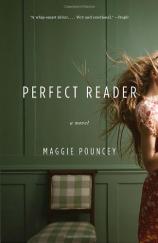Perfect Reader
Review
Perfect Reader
In a recent essay in The New Republic, Jed Perl mused about the “flood of posthumous publications” pouring forth from writers like Nabokov, Ellison and Henry Roth. That they’ve written for publication, he argues, doesn’t necessarily mean they intended all their work to be consumed by a coterie of hungry readers. The dilemma that insight presents to those responsible for a writer’s literary legacy is elegantly framed and thoughtfully considered in Maggie Pouncey’s first novel.
When her father, a Thomas Hardy scholar and former college president, dies suddenly, Flora Dempsey leaves her job as editor of a magazine for the “domestically obsessive and organically minded” to return to the small New England town of Darwin (“three hours from everywhere”) to act as his literary executor, or “High Literary Executioner,” as she grimly recasts it. Lewis Dempsey was the author of a critically esteemed and popular study of poetry, Reader as Understander, that prefigures the role of Flora, anything but a literary scholar and ill-equipped for the undertaking.
Along with a duffel of clothes she calls her “body bag,” Flora brings a copy of a handwritten poetry collection her father had casually handed over during one of their last meetings. “He had wanted to be the poet, and not the poet’s ideal reader, but had taken the safer route. And had been dissatisfied all those years on the wrong side of the words,” she concludes. Settling uneasily into her father’s house, with its leaking roof, its creaks and groans, she bends to the unpleasant task before her.
Initially resistant to reading the poems, even contemplating tossing the pages into a blazing fire one chilly November day, Flora eventually succumbs, soon discovering the work's remarkable erotic and self-revelatory qualities. Complicating her task is the presence of Cynthia Reynolds, Lewis’s lover and a professor of art history at Darwin College who is the inspiration for the poems and whose desperation to see them published clashes with Flora’s equally fierce reticence at that prospect.
The novel slips effortlessly from Flora’s present-day dilemma back to the time, 20 years earlier, when her parents’ marriage fractured. Recalling the pain of those days, Flora sifts through memories of time spent with her emotionally distant father --- Tuesday night “dates” at a local Japanese restaurant, or walks through Darwin’s nature preserve --- confirming her belief that poets like Hardy and Larkin were “a more reliable presence in his life than his own blood.” She’s haunted, too, by memories of her childhood friend’s accident in which she played a part, permanently severing their relationship.
What begins as self-imposed isolation soon gives way to encounters with other Darwin residents, all of whom have their own unfinished business with the memory of Flora’s father. Paul Davies, Lewis’s lawyer and one of his admiring former students, falls into an affair with her. She audits a poetry class taught by Sidney Carpenter, an elderly academic rival of her father who reminds her (and us) that “every silent revelation, every moment of recognition that takes place on the page between reader and writer is a renewal and rebirth.” In these relationships and others, Flora learns, “The dead left you alone, but it was the living who filled you up with loneliness.”
There no revelatory flashes of light to illumine Flora’s way, only a slowly deepening understanding of her father’s life and work as she moves toward a decision about the poems' fate that feels both sensible and satisfying. Pouncey confidently foregoes any gimmicks, her prose tempered and understated and her control of each meaningful scene confident and sure. Portraits of characters who might be unsympathetic in another author’s hands (a former schoolmate of Flora's who has embraced the principles of intelligent design in a town named for its chief villain, to cite one) are skillfully drawn. The daughter of a former college president herself, Pouncey has a keen eye and well-tuned ear for the quirks of small-town college life. Whether it’s Darwin’s decision to declare itself a “nuclear-free zone” or its Springtime Salamander Crossing, she captures the college’s influence and its existence as a thing apart.
But PERFECT READER never strays far from the fraught relationship between father and daughter that lies at its heart. “We want to know our parents’ secrets,” writes Pouncey, “their lives before and beyond our own. But then to know can be terrible. To know is to want not to know.” It’s that desire, made more poignant by the challenge of confronting a deceased parent both in memory and on the page, that’s so deftly portrayed in this pensive character study.
Reviewed by Harvey Freedenberg on January 17, 2011
Perfect Reader
- Publication Date: July 12, 2011
- Genres: Fiction
- Paperback: 288 pages
- Publisher: Anchor
- ISBN-10: 0307474801
- ISBN-13: 9780307474803



